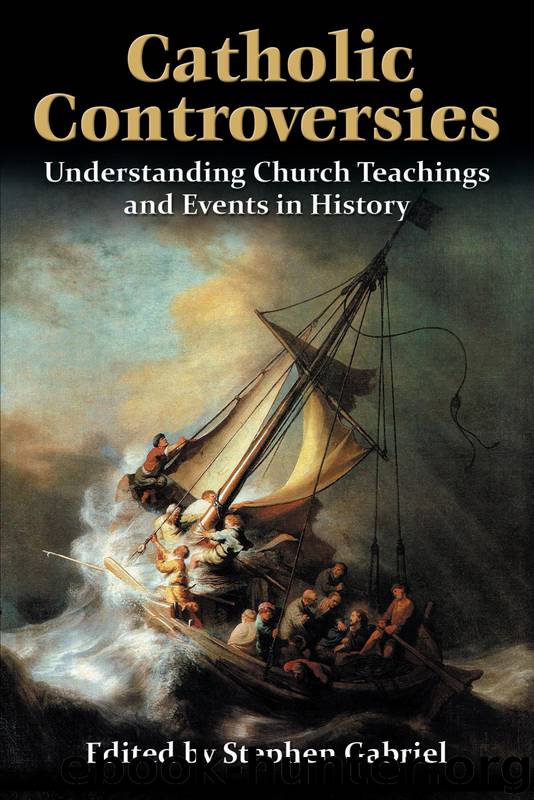Catholic Controversies Ebook by Stephen Gabriel

Author:Stephen Gabriel [Gabriel, Stephen]
Language: eng
Format: epub
Published: 0101-01-01T00:00:00+00:00
Chapter 13
The Sacrament of Confession
A common lament these days is that the lines for Communion are long but the lines for Confession are very short. Indeed, the sacrament of Confession seems to have fallen out of fashion―due, no doubt, to the loss of the sense of sin that many commentators have pointed out, including Pope John Paul II.
It is not unusual to hear lapsed Catholics complain that the Church put them on a “guilt trip.” These people do not seem to realize the profound value of the feeling of guilt that we experience when we sin. Guilt is real. Guilt arises when a functioning conscience tells us we have done wrong. It is the first step toward repentance, forgiveness, and peace.
Some may think of the sacrament of Confession as sort of a “dumping ground” where sinners go to unburden themselves and then resume their sinful ways. However, this is not the case. We are forgiven our sins in the sacrament of Confession only when we are truly sorry and have the firm intention of avoiding those sins confessed. The goal of confession is a conversion of the heart.
We have all heard people say, “I can confess my sins directly to God.” This is true! We can and we should confess our sins to God and express our profound sorrow to him in our prayers. However, this is not the way Our Lord prescribed for us to obtain forgiveness. Scripture makes it clear that Jesus gave the Apostles and (logically) their successors the power to forgive sins. He instituted the sacrament of Confession because he knew that we needed it. Can God forgive sins outside of the sacrament? Of course he can; God is not constrained by his sacraments. But it is his will that we confess to a priest in the sacrament as the normal manner of obtaining forgiveness. We ignore God’s will in this matter at our own peril!
In “Why Go to Confession?,” Father William Saunders cites the Scriptural basis for the sacrament as well as the evidence that the early Church took Our Lord’s words seriously and celebrated the sacrament.
>Our Lord entered the world to forgive sins, and he made clear that he wanted this ministry of reconciliation to continue after he ascended to the Father.
>On the day of his Resurrection, Jesus said, “Receive the Holy Spirit. If you forgive men’s sins, they are forgiven them; if you hold them bound, they are held bound” (John 20: 21-23).
>St. Paul said, “God has reconciled us to Himself through Christ and has given us the ministry of reconciliation” (2 Cor 5:18).
>An early work written around 80 A.D., The Didache (or Teachings of the Twelve Apostles), makes it clear that penitents were to confess their sins prior to receiving Holy Communion.
>The writings of several early Church Fathers (Saints Cyprian, Ambrose, and Athanasius) refer to the practice of confessing one’s sins.
>For those truly aspiring to a Christ-like life, regular Confession (every one or two months) is recommended. We should confess both sins of commission and sins of omission.
Download
This site does not store any files on its server. We only index and link to content provided by other sites. Please contact the content providers to delete copyright contents if any and email us, we'll remove relevant links or contents immediately.
The Secret Power of Speaking God's Word by Joyce Meyer(3154)
Signature in the Cell: DNA and the Evidence for Intelligent Design by Stephen C. Meyer(3123)
Real Sex by Lauren F. Winner(3002)
The Holy Spirit by Billy Graham(2938)
The Gnostic Gospels by Pagels Elaine(2516)
Jesus by Paul Johnson(2349)
Devil, The by Almond Philip C(2323)
23:27 by H. L. Roberts(2245)
The Nativity by Geza Vermes(2221)
Chosen by God by R. C. Sproul(2157)
All Things New by John Eldredge(2149)
Angels of God: The Bible, the Church and the Heavenly Hosts by Mike Aquilina(1950)
The Return of the Gods by Erich von Daniken(1925)
Angels by Billy Graham(1917)
Knowing God by J.I. Packer(1848)
Jesus of Nazareth by Joseph Ratzinger(1801)
The Gnostic Gospel of St. Thomas by Tau Malachi(1781)
How To Be Born Again by Billy Graham(1775)
Evidence of the Afterlife by Jeffrey Long(1773)
